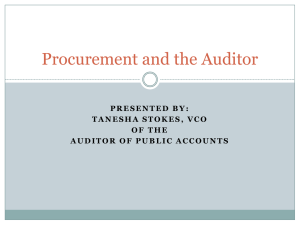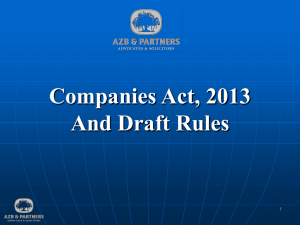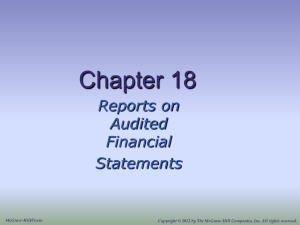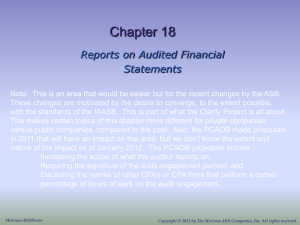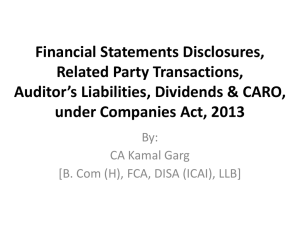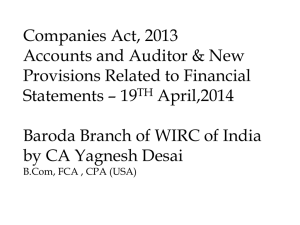Cont. - The University of Texas at Austin
advertisement
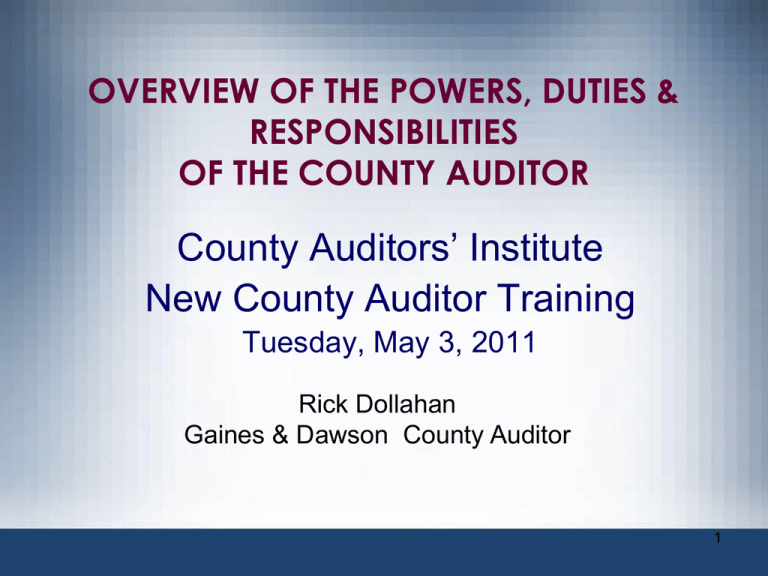
OVERVIEW OF THE POWERS, DUTIES & RESPONSIBILITIES OF THE COUNTY AUDITOR County Auditors’ Institute New County Auditor Training Tuesday, May 3, 2011 Rick Dollahan Gaines & Dawson County Auditor 1 Introduction • A quote from a 1997 U.S. Court of Appeals, 5th Circuit Court case states, “In other words, Texas gives county auditors responsibility for guarding the public purse and using the authority of the auditor’s office to ensure that local governments comply with the law.” • The powers and responsibilities of the county auditor reach into every corner of the courthouse. • A county auditor not only provides oversight for the public but will also assist in ensuring that Texas counties are able to meet the increasing demands of fiscal accountability in the future • It is no wonder that the job of a Texas county auditor is one of the most difficult positions in the state. Tommy Thompkins, extracted from “Someone Knew What They Were Doing” Introduction (Cont.) • The County Auditor has been described in the following ways: – …one of the most important officers in the county organization. W. C. Murphy, County Government and Administration in Texas (University of Texas Bulletin 1933) – …the lynch-pin around which the county government turns. Holman & Gough, A Study of County Government in Texas (1956) Introduction (Cont.) • …..Since the Auditor has the authority to impose a budget upon the county because of his POWER to stop payment on all warrants not drawn strictly according to the law, he has been in a position to dominate county finances. W. C. Murphy, County Government and Administration in Texas (University of Texas Bulletin 1933) • …chief addition to the financial organization of the county since the adoption of the present constitution… David Brooks, Texas Practice, County and Special District Law LEGISLATIVE HISTORY 5 LEGISLATIVE HISTORY • 1905 – 29th Legislature – Legislation establishing the office of County Auditor • Appointment of a “man of unquestionably good moral character and intelligence.” • Appointment by “special meeting” of county and district court judges.” • Established an annual salary of $2,400. • Applied to counties that had a city with a population of 25,000 or more, regardless of tax base. LEGISLATIVE HISTORY (CONT.) • The Emergency Clause of the 1905 law stated a “very great need and urgency” for the creation of the office of county auditor. • The Law also established budgeting and competitive bidding procedures David Brooks, Texas Practice, County and Special District Law LEGISLATIVE HISTORY (CONT.) 1907 – 30th Legislature • First amendment to original legislation • Added “any competent accountant” regardless of whether he had “two years actual experience in practical book keeping” as required by the original enactment. • Added any county with a population of 40,000 or more in addition to the city with a population of 25,000 or more. 1915 – 34th Legislature • City population requirement reduced to 20,000. David Brooks, Texas Practice, County and Special District Law LEGISLATIVE HISTORY (CONT.) 1917 – 35th Legislature • Added authority of Commissioners Court to certify to district judges the need to appoint a county auditor in counties not required to have one. • • Designated only the district court judges as the appointing authority. Added a two-year county residency requirement. (Repealed in 1989) 1923 – 38th Legislature • Increased county auditor’s salary to $3,600. • Lowered population requirement for appointment to 35,000. David Brooks, Texas Practice, County and Special District Law LEGISLATIVE HISTORY (CONT.) 1941 – 47th Legislature • District judges were first granted authority to set the county auditor’s salary. Any increase above 1940 salary level required commissioners court approval. • Salary could not be higher than county tax collector. 1955 – 54th Legislature • Removed authority of commissioners court to approve the county auditor’s salary set by the district judges. • Made the auditor’s bond payable to the district judges rather than the county judge. David Brooks, Texas Practice, County and Special District Law LEGISLATIVE HISTORY (CONT.) 1981 – 67th Legislature • County population minimum requiring a county auditor reduced from 35,000 to 10,000. Also removed minimum tax valuation rule of $35 million. David Brooks, Texas Practice, County and Special District Law 1987 – 70th Legislature – (Codification of LGC) • The amount of the compensation and allowances of a county auditor may not exceed the amount of the compensation and allowances received from all sources by the highest paid elected county officer, other than a judge of a statutory county court, whose salary and allowances are set by the CCrt. § 152.032 Texas Local Government Code LEGISLATIVE HISTORY (CONT.) 1997 – 75th Legislature • Relating to county auditors who serve more than one county. • Removed the requirement to have a population of less than 25,000 and provides that a Commissioners courts of two or more counties may agree to jointly employ and compensate a county auditor. • Note: Subtitle for LGC 84.008 still reads as “Joint Employment of County Auditor in Counties With Population of Less Than 25,000”. Awaiting clarification but legislative intent is clear. § 84.008(a) Texas Local Government Code LEGISLATIVE HISTORY (CONT.) 2001 – 77th Legislature • Relating to the amount of compensation and allowances for county auditors . • This subsection applies only to a county that employs an arena venue project manager hired as of March 7, 2001, and that has a population of less than 1.4 million in which a municipality with a population of more than one million is located. The amount of the compensation and allowances of a county auditor in a county subject to this subsection may not exceed the amount of the compensation and allowances received from all sources by the county budget officer. If the county hires a county budget officer at a salary lower than the salary of the previous county budget officer, the county auditor's salary may not be reduced on that basis. § 152.032(b) Texas Local Government Code LEGISLATIVE HISTORY (CONT.) 2001 – 77th Legislature • Relating to the appointment of a county auditor in certain counties . • Raised the population requirement for the appointment of a county auditor by the district judge(s) from 10,000 to 10,200. § 84.002 (a) Texas Local Government Code LEGISLATIVE HISTORY (CONT.) 2003 – 78th Legislature • Relating to the amount of compensation and allowances for certain county auditors. • Added bracketed exception that only applies to a county with a population of more than 800,000 that uses an automated system to enhance internal controls of county finances through the use of automated edit checks of its automated purchasing system and its comprehensive automated payroll system. The amount of the compensation and allowances of a county auditor in a county governed by this subsection may exceed the limit imposed by Subsection (a) if the compensation and allowances are approved by the commissioners court. If a county is governed by this subsection and Subsection (b), the amount of compensation and allowances received by the county auditor may not exceed the limit imposed by Subsection (b). § 152.032 (d), (e) Texas Local Government Code LEGISLATIVE HISTORY (CONT.) 2003 – 78th Legislature • Relating to certain employment matters affecting a county auditor, assistant auditor, court reporter, or sheriff department personnel. • Added (d): Except as provided by Subsection (b), in a county with a population of 500,000 or more the amount of the compensation and allowances of a county auditor may be set in an amount that exceeds the limit established in Subsection (a) if the compensation and allowances are approved by the CCrt of the county. • § 152.032(d) Texas Local Government Code LEGISLATIVE HISTORY (CONT.) 2003 – 78th Legislature • Relating to certain employment matters affecting a county auditor, assistant auditor, court reporter, or sheriff department personnel. (Notice of hearing to set annual amount of compensation for auditors, assistant auditors & court reporters) • Amended (c): changed 15th day to “Not earlier than the 30th or later than the 10th day before the date of the hearing, notice of the time, place, and subject of the hearing must be published in a newspaper of general circulation in the county.” • § 152.905(c) Texas Local Government Code LEGISLATIVE HISTORY (CONT.) 2005 – 79th Legislature • SENATE RESOLUTION NO. 422 • The Senate of the State of Texas recognized county auditors across the state on the occasion of the 100th anniversary of the creation of the office of county auditor by the Texas Legislature. www.texascountyauditors.org 18 LEGISLATIVE HISTORY (CONT.) 2007 – 80th Legislature • Relating to limitations on the compensation of county auditors for certain counties. • Amended (d) to add population brackets for >77,000 and <80,000 or …borders Gulf of Mexico with population of >1,000 and < 21,000. Also adds language to include counties bordering Subsection (b) with population of >50,000 and <85,000…allowing for the amount of compensation and allowances of county auditor may be set in an amount that exceeds the limit established in Subsection (a) if approved by the commissioners court. • § 152.032 (d) Texas Local Government Code LEGISLATIVE HISTORY (CONT.) 2009 – 81th Legislature, (Proposed HB 2320) • Relating to the appointment of a county auditor in certain counties. • Increase the population requirement from 10,200 to 18,000 whereby the district judges shall appoint a county auditor in a county with a population of more than 18,000 and optionally if less than 18,000. (per committee substitute) • Final status: Did not get enacted § 84.002 (a), (b) Texas Local Government Code LEGISLATIVE HISTORY (CONT.) 2009 – 81th Legislature, (HB 1230) • Relating to limitations on the compensation of county auditors for certain counties. • Re-wrote 2007 changes and amends (d) to lower population brackets from 500,000 to 120,000 …for the amount of compensation and allowances of county auditor may be set in an amount that exceeds the limit established in Subsection (a) if approved by the commissioners court. • Final status: Effective 06/19/2009 § 152.032 (d) Texas Local Government Code LEGISLATIVE HISTORY (CONT.) 2011 – 82nd Legislature, HB 562 • Relating to the appointment of a county auditor in certain counties. • Increase the population requirement from 10,200 to 12,000 whereby the district judges shall appoint a county auditor in a county with a population of more than 12,000 and optionally if less than 12,000. • Stated reasons during legislative testimony – We are too expensive, an unfunded mandate, and the CCrt cannot afford our budget in these lean times – The Treasurer can do our jobs • 13 counties affected, 9 have sitting Auditors, over 30 counties below 10,200 have County Auditors • Final Status. Unclear at this time § 84.002 (a), (b) Texas Local Government Code AN OVERVIEW OF HISTORY IN CASE LAW 23 Commissioners Court of Navarro County v. Tullos (1922) The commissioners court of Navarro County, sued for mandamus action to compel the county auditor to turn his financial records over to a special accountant hired by the commissioners court. Commissioners court alleged that : • “The records of the auditor’s office do not correctly show the true facts with relation to the County Clerk’s office.” • Misappropriation of funds by former elected officials, (county judge, a commissioner, tax collector and treasurer), were not reported to the commissioners court by the previous county auditor. 24 Commissioners Court of Navarro County v. Tullos (1922) Commissioners court further stated: •“That in order to ascertain the true facts it is necessary that the commissioners court should be permitted, with the aid of its expert accountant, to examine and inspect the books and other records of the auditor’s office.” •“…because the large details and complications involved in keeping correct accounts of the various funds… a proper examination of the auditor’s office and the books, papers and accounts kept therein renders it necessary that an expert accountant having the necessary qualifications and experience do said work.” 25 Commissioners Court of Navarro County v. Tullos (Findings) •The Court of Appeals held that the auditor could not be mandamused to turn his records over to a special auditor. •The Court held that the duties of the county auditor cannot be delegated by the commissioners court to a special auditor. •In other words, the commissioners court cannot hire its own auditor to do the job of the county auditor. 26 Commissioners Court of Harris County v. Fullerton (1980) •Fullerton, the Harris County Auditor, sued to compel the Commissioners Court to approve his request for office equipment, supplies and other property and services which he considered necessary to operate his office. •Commissioners Court had transferred the Auditor’s computer to another office under their control and had refused the auditor’s request for certain office equipment. 27 Commissioners Court of Harris County v. Fullerton (Findings) •Commissioners court is under ministerial duty to approve office equipment requested by the auditor absent an abuse of discretion in the request. •The commissioners court may reject the auditor’s request for equipment and supplies only if the request is excessive or unreasonable. •The court stated that the auditor’s office was “clothed with an impressive array of independent administrative duties and discretionary powers long recognized by our courts.” 28 Commissioners Court of Harris County v. Fullerton (Findings) • Did not specifically determine whether the auditor’s budget requires approval of the district judges. • Commissioners court cannot dictate what equipment would be used in the auditor’s office. • In rejecting the auditor’s budget request, the commissioners court had not considered its necessity or reasonableness; this was found to be an abuse of discretion by the commissioners court and an “illegal intrusion” upon the auditor’s office. 29 Agan v. Commissioners Court of Titus County (1996) •Commissioners Court relieved the County Treasurer of payroll function (receiving time sheets, entering payroll data into the computer system and printing payroll checks) and transferred the employee who performed these duties to the Auditor’s Office. •Agan argued that the proper computation of the county payroll and deductions was inherent in the statutory duties which require the treasurer to disburse funds. •“To reduce the duties of a constitutionally created office to the mere duty of signing a check reduces the job of county treasurer to a mere ministerial function.” 30 Agan v. Commissioners Court of Titus County (Findings) •Commissioners Court has the authority to delegate the payroll function to whatever county official it desired. •Contains the most authoritative listing of the constitutional and statutory duties of the County Treasurer •Reinforced the principle that any county functions that are not assigned to an officer by the constitution may be delegated to an officer by the legislature. •Those duties that have been specifically assigned by the constitution or the legislature cannot be removed from an officer by the Commissioners Court. 31 Commissioners Court of Collin County v. Cozad • Relating to the authority of the county auditor to examine & audit the configuration, security, processes and user rights of county software systems. • Trial court summary judgment in favor of county auditor. • Commissioners Court appealed. Withdrawn/Dismissed by 5th Court of Appeals. • Settlement: MOU (Memorandum of Understanding) – County paid Auditor’s legal fees and agreed to purchase software for auditing software vs. program modifications. 32 “Is the County Auditor a County Employee” • The County Auditor is a “Public Official” as opposed to a “Public Employee”, as determined by the test created in Aldine Independent School District v. Standley 280 S.W. 2d 578 (Tex. 1955). 33 Aldine Independent School District v. Standley The criteria for a “Public Official” was held to be: • • • • A “term” of office of two years or more A requirement for bond and oath Statutory qualifications for office required “The determining factor which distinguishes a public officer from an employee is whether any sovereign function of the government is conferred upon the individual to be exercised by him for the benefit of the public largely independent of the control of others.” 34 Laord v. Como 137 S.W. 2d 880 (Tex Civ App-Ft. Worth, 1940, writ referenced) • “There are material distinctions between one occupying an official position and another who performs duties purely by virtue of employment. – An official may be and often is elected by the resident electors; – He subscribes the oath of office and is entrusted with the performance of some of the sovereign functions of government; – Is subject to removal for failure to so perform the duty or for misconduct or malfeasance in office; – His election or appointment is for a definite period of time – And his services hereby become a continuing and permanent, rather than temporary and transitory, as is the case of an employee under a contract.” 35 Carver v. Wheeler County, 200 W.W. 537 (Tex. Civ.App. – Amarillo, 1918, no writ) • Thus, unlike employees or agents who may have contractual rights for continued employment with a county, a public official has no property or contractual rights in his office. • Both cases affirmed this position Guerrero V. Refugio County, 946 S.W. 2d 558 (Tex. App. – Corpus Christi, 1997, no writ) 36 HOW DID WE GET HERE? • By political appointment, don’t ever forget that – We have to learn right away how to operate in a political environment whether we like it or not • Sometimes through relationships, sometimes through reputation – Very few of us really understand what we are getting in to • Not for the faint hearted, it takes courage to accept that appointment 37 APPOINTMENT Texas Local Government Code (LGC) •§ 84.002. Appointment of County Auditor •§ 84.003. Procedure for Appointment •§ 84.004. Term •§ 84.006. Qualifications •§ 84.007. Bond and Oath •§ 84.0085. Continuing Education •§ 84.009. Removal •§ 84.021. Assistants 38 APPOINTMENT (Cont.) • § 152.905. Procedures for Setting Compensation by District Judges • § 152.031. County Auditor's Salary • § 152.032. Limitations on County Auditor's Compensation and Allowances • § 152.034. Salaries of Assistants to the County Auditor • § 111.074. Limitation on Budget of County Auditor • Opinion No. DM-118 May 13, 1992 Auditor’s salary increases are not included in “the amount budgeted for expenses of the county auditor’s office…” AUTHORITY (POWERS ) OF THE COUNTY AUDITOR 40 STATUTORY AUTHORITY • It is often difficult to determine where “authority” gives way to “responsibility”. • Statutory authority establishes legal rights that make it possible for the County Auditor to fulfill his/her statutory responsibility. • There are four types of statutory authority, all of which overlap throughout the statutes: • Oversight Authority • Access Authority • Prescriptive Authority • Verification Authority OVERSIGHT AUTHORITY • According to the Texas Local Government Code (LGC) the county auditor has general oversight of county books and records. LGC § 112.006 (a) • Oversight generally means watchful and responsible care including, but not limited to: • Access to books, records, and property; and • The authority to help ensure that those books and records are properly maintained. 42 OVERSIGHT AUTHORITY (Cont.) • The overriding duty is that the county auditor shall see to the strict enforcement of the law governing county finances. LGC § 112.006 (b) • In Smith v. McCoy (Civ. App. 1976) S.W. 2d 457, it was determined that the county auditor has the responsibility, before approving a claim against the county, to determine whether the claim strictly complies with the laws governing county finances. 43 ACCESS AUTHORITY • According to the Texas Local Government Code the county auditor has continuous access to county books and records. LGC § 115.001 • Access generally means the right or authority to enter, inspect or review. • Generally speaking, the county auditor may look at anything that pertains to county finances. (ref. AG Op. M-756, 1970; H-1185, 1987; H-1212, 1978). 44 PRESCRIPTIVE AUTHORITY • County population of less than 190,000 The county auditor may adopt and enforce regulations, not inconsistent with law… that the auditor considers necessary for the speedy and proper collecting, checking, and accounting of the revenues and other funds and fees that belong to the county. LGC § 112.001 • County population of 190,000 or more The county auditor shall prescribe the system of accounting for the county in addition to the adoption and enforcement of regulations as above. LGC § 112.002 45 PRESCRIPTIVE AUTHORITY (Cont.) • The county auditor shall determine: 1) the time and manner for making reports to the auditor; and 2) the manner for making an annual report of A. office fees collected and disbursed; and B. the amount of office fees refunded to the county in excess of those that the officer is permitted by law to keep. LGC § 114.002 46 PRESCRIPTIVE AUTHORITY (Cont.) • Prescriptive authority allows, and in some cases requires, county auditors to prescribe accounting and/or bookkeeping systems, and to prescribe frequency, format and content of reports. • Attorney General opinions have extended this authority to the County Attorney’s “hot check fund” (JC-0084), to the County Sheriff’s “commissary fund” (DM-0067), and to “forfeiture funds” (DM-0247). 47 VERIFICATION AUTHORITY • A claim, bill, or account may not be allowed or paid until it has been examined and approved by the auditor. It is a condition “precedent” to CCrt Approval. LGC § 113.064 • The county auditor may require an affidavit from a county official indicating that the claim or bill is correct and valid. LGC § 113.064 • The county auditor may not audit or approve a claim unless the claim was incurred as provided by law. LGC § 113.065 • In counties over 125,000 in population, the county auditor is to verify the revenues available to the county in the budgeting process. LGC § 111.034, 111.063 48 DUTIES & RESPONSIBILITIES OF THE COUNTY AUDITOR 49 The basic Duties & Responsibilities of the County Auditor falls into several broad categories. • • • • • Budgeting Accounting and Financial Reporting Auditing Countersigning Check/Warrants Approving Claims The basic Duties & Responsibilities of the County Auditor falls into several broad categories. (Cont.) • Reporting • Purchasing • The Infamous “Other” BUDGETING (LGC Ch. 111) • Subchapter A, B, & C all outline differing duties for the County Auditor dependent upon county size. • For instance, the County Auditor is the budget officer in some counties (Sub. Ch. B), in smaller counties, assists the County Judge preparing the budget. (Sub. Ch. A), might be in Sub. Ch. C counties. – In many cases, does much…much more • Many of budgeting responsibilities stay the same for the County Auditor regardless of county size. Know the rules your county falls under. • Once the CCrt adopts a budget the Auditor’s focus must shift from budget preparation to budget compliance. • Exercise oversight authority to see that only properly budgeted expenditures are approved for payment by the county. ACCOUNTING & FINANCIAL REPORTING • The Auditor is required to keep a detailed set of records showing all county transactions relating to accounts, contracts, indebtedness, receipts and disbursements. • May adopt and enforce regulations the Auditor considers necessary for the speedy and proper collecting, checking, and accounting of the revenues and other funds/fees that belong to the county. • Specify the system of accounting (shall >190K, may <190K) for the county as a whole and for individual fee offices. ACCOUNTING & FINANCIAL REPORTING (Cont.) • General oversight of officials books and records. • Shall see to the strict enforcement of the law governing county finances • Responsibility for the chart of accounts and the design of the accounting system. • Maintain the general ledger of the county throughout the year. • Preparation of the annual financial report. • Grant accounting and reporting. • And……more ACCOUNTS PAYABLE AND PAYROLL • Optional duties by law. • If processed by the county auditor these duties meet the auditor’s duty for verification of financial transactions. • These duties directly relate to the responsibility to manage the county budget and to verify the correctness and legality of claims against the county before they are processed. AUDITING • Internal auditing is a specific statutory duty of the county auditor. • See to the strict enforcement of the laws governing county finances • Audit Officials books, accounts, reports, vouchers, and other records. • Audit the CCrt orders relating to county finances. • Audit reports about the collection of money for the county. • Audit books and reports of county officials at least quarterly. AUDITING (Cont.) • Audit the county treasurer’s books and reports. • At least quarterly, do a surprise audit of funds held by the county treasurer. At least annually, do a surprise check of all officials • Audit the books and dockets of court clerks and justices of the peace, constable, sheriff, & tax assessor to make sure that they aren't holding any money that belongs to the county. • Perform random cash counts APPROVAL OF CLAIMS • The county auditor may not audit or approve a claim unless the claim was incurred as provided by law. • This process is a “condition precedent” to commissioners court even considering the claim. • The county auditor must co-sign disbursement checks to validate them as proper and budgeted expenditures. (Does not apply to jury checks.) • The auditor may not pay for supplies or materials that have not been properly requisitioned and approved. Reporting • Monthly: – Reports to the CCrt showing the amount budgeted, received/expended for the month & year to date, & balances. – Report of the county’s receipt/disbursements and the county accounts – >225k must report to the CCrt the county’s financial condition. • Monthly/Annually – – – – – Total amount received/disbursed from each fund The amount of funds on deposit in the county depository Amount of bonded debt/other debt Anything else the Auditor considers appropriate A record of transactions made during the year Reporting (Cont.) • Auditor’s must determine when and how reports are made to them. • Must require anyone who receives county money, disposing, or managing county property to make reports to the County Auditor Purchasing • The County Auditor can serve as the Purchasing Agent in some counties • In others, we simply audit the process. • In either case, we are charged with ensuring that the purchasing statutes are strictly followed. – Sometimes that means that we are much more involved on the front end than we would prefer to be to ensure that things are done right – This oftentimes prevents problems on the back side Other Duties & Responsibilities • 254 counties, 254 ways of doing things • Some of what the County Auditor is called upon to do is statutory, some is driven by the old “someone has to do it, to make sure that it is done right”. • Literally hundreds of statutes designate various duties to the County Auditor. • Study and learn the statutes, AG opinions etc… CHALLENGES FACING THE COUNTY AUDITOR • The nature of the position requires the county auditor to regularly face many challenges in the performance of his/her duties. – Maintaining Independence – Mastering diverse functions – Politics MAINTAINING INDEPENDENCE • The office of county auditor was created to provide independent oversight of the financial transactions of the county. • Independence in appointment, budget and staffing is necessary to insure the functions of the office are handled in a professional manner. • We are independent from the District Judge, the CCrt, and any other official or office in the county as specified in many court cases. • These are our neighbors, friends, co-workers and this can be hard, but must be done at all costs MASTERING DIVERSE FUNCTIONS INCLUDING, but not limited to: • Governmental accounting and financial reporting • Internal auditing • Grants management • Debt issuance & Cash Management • Management MASTERING DIVERSE FUNCTIONS INCLUDING (Cont.), but not limited to: • Budgeting and budgetary control • Compliance with laws governing county finance • Personnel and employment law • Risk management POLITICS • Working with the personalities of many different elected officials. • Co-existing while exercising oversight and prescriptive authority. • Staff recruitment, development and retention in the county government environment. • “Inherent” conflicts due to the unique nature of the position of county auditor and county government as a whole. JUST A FEW CLOSING WORDS OF WISDOM • While our function of county government is under the administration of the district courts, we are still a function of county government as a whole. • The following are some County Auditor Do’s & Don’t to assist you with your day to day responsibilities. DO • Get a copy of the County Financial Management Handbook, January 2004 from the OCA website. – Lots of good information about your duties. – Much of what I have just covered came directly from there. – County Auditor Chapter, Section E. has a checklist that DJs are encouraged to use to evaluate you. – Want to know what they expect of you, look there as a starting point!!! 69 DO • Keep the district judge(s) informed. • Communicate frequently with all officials. • Know your statutory duties and authority and keep current on all legislative changes. • Use technical assistance of state offices (i.e., State Comptroller, Attorney General, State Auditor). • Use local resources, especially the District Attorney and County Attorney. • Use the media often and facilitate information. 70 DO • Discuss critical issues in advance with the County Judge and individual Commissioners prior to public agenda presentation. • Attend all Commissioners Court meetings for first-hand knowledge of all actions taken. • Participate in continuing education programs and include your assistants. • Be available at all times. • Create and protect a positive image for your office and yourself. • Use plain old Common Sense!!! 71 DON’T • Embarrass your district judge(s). • Embarrass yourself or anyone else in public or private. • Argue with any public official in any public meeting. • Refuse assistance to any reasonable request. • Bad-mouth any official, employee or department at any time. • Don’t try to tell them what they can and cannot buy if what they are doing is legal. • Use what I call the Red or Blue pencil rule • Encourage gossip. 72 DON’T • Abuse your authority. • Ignore staff recommendations and ideas. • Overlook any details related to the public business of the county. • Compromise your principles or ethics. • Procrastinate on or ignore any issue placed before you. • Lose your composure under any circumstance. • GUESS!!! 73 CREDITS Many thanks to those who played such an important part in developing the information contained in this presentation. • Kelly Bollinger and staff, LBJ School, Office of Conferences & Training • James Wells, Denton County Auditor • David Austin, Ector County Auditor • John Reynolds, 1st Assistant County Auditor, Bexar County • David Brooks, attorney and author of Texas Practice, County and Special District Law • Paula Welch, Former Navarro County Auditor • Jimmy Mynar, Burleson County Auditor 74 A special thanks to you as class participants. Thanks so much for your attention. Good luck as you experience The Wonderful World of County Government!!! 75
